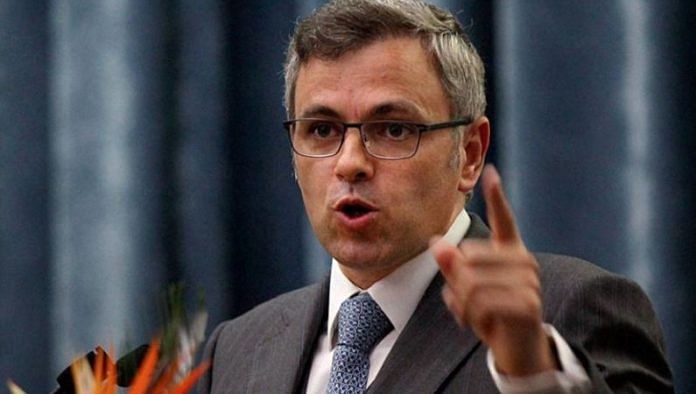Omar Abdullah says NC agreed to support a PDP-led govt from outside and not a long-term arrangement because it did not want to look ‘desperate for power’.
New Delhi: Mehbooba Mufti’s Peoples Democratic Party (PDP) had made an open offer to the National Conference (NC) to lead a grand alliance in Jammu and Kashmir that opposed the Bharatiya Janata Party (BJP), but the NC turned down the offer, former Jammu & Kashmir chief minister and NC leader Omar Abdullah said Thursday.
In an exclusive interview with ThePrint on the phone from Srinagar, Abdullah said the NC made the decision because it did not “want a long-term arrangement which looked like we were desperate for power”.
The NC had, however, agreed to support a PDP-led government from the outside until January, when the case around Article 35A came up in the Supreme Court, said Abdullah.
A constitutional provision, Article 35A grants the Jammu & Kashmir legislature the power to define the state’s permanent residents.
Abdullah’s comments are significant in the light of the “telefax drama” that took place in Jammu and Kashmir’s Raj Bhavan in the last 24 hours, after Mufti’s letter staking claim to form the government was allegedly not received at the Governor’s house, allegedly because the fax machine wasn’t working.
Similarly, BJP ally and People’s Conference leader Sajad Lone’s fax from London, staking claim to form a government, was also allegedly not received in the Raj Bhavan Wednesday.
By the evening, however, faced with competing claims over government formation, governor Satya Pal Malik dissolved the House.
It is expected that elections to the state assembly will now take place alongside general elections in 2019.
Also read: 3 reasons why alliance with Mehbooba Mufti’s PDP could hit Congress, NC in Jammu & Kashmir
Defence of Article 35A
In his phone interview, Abdullah said while the NC had refused to join a PDP-led government, the party agreed to support such a government formation from the outside because “we agreed there was a need to come together to fight the onslaught of the BJP to dismantle the fabric of Jammu & Kashmir. Communal harmony was being badly affected, as was the threat of doing away with the special status of J&K”.
“For us, the challenge was bigger. It was a bigger fight. This was never about creating a government for the long-term,” Abdullah said.
“Come January 2019, we had agreed to mount a robust defence of Article 35A when the matter came up in the Supreme Court and put to rest the threat to the state’s special constitutional status.
“After that the chief minister would step down and the caretaker government would recommend dissolution of the assembly, paving the way for elections,” Abdullah said.
Asked why the people would vote for a temporary government that simply came together for a few months for the sole purpose of sharing power, Abdullah denied that that was the objective.
“(PDP leader) Altaf Bukhari came to my father, Farooq Abdullah, about a week ago and made him an open offer for one of us to lead the mahagathbandhan, or grand alliance,” Abdullah said.
“But my father said that he had no intention of leading a government again and I felt it was better to have elections, so that the people could decide.
“If the objective was power, then surely we would not have turned down such an offer. But I and my party were clear from the start that this government formation was not going to be a long-term arrangement which looked like we were desperate for power,” Abdullah said.
Also read: J&K governor dissolves assembly after rival alliances stake claim
‘Sense of unease’
The BJP, he pointed out, was vilifying an entire community, referring to former deputy chief minister Kavinder Gupta’s comments that it “had been on Pakistan’s instructions” that the PDP and NC had decided to boycott the local body elections.
“For the last several months there has been a general sense of unease, as if a sword was hanging on all our heads,” Abdullah said.
The BJP was engineering defections on the one hand, both promising MLAs a larger share of the pie in a new government and then threatening them with investigations by the National Investigation Agency (NIA) if they didn’t comply, he said.
Asked if he was referring to Wachi MLA Aijaz Ahmad Mir, who had been quoted by Mufti in the The Indian Express as being threatened by the BJP into leaving the PDP or going to jail, Abdullah said, “I have heard this story from five different people with little contact between each other and I have little reason to disbelieve them.”




Everyone wants power without responsibility.
At least on something as important as Kashmir, there ought to be a clear policy, anchored in national interest. Even that is proving elusive. If a stable coalition that brought together the two important regions could not administer the state well over a period of three years, unclear what could have been gained by creating a wobbly arrangement with Sajad Lone at the head.